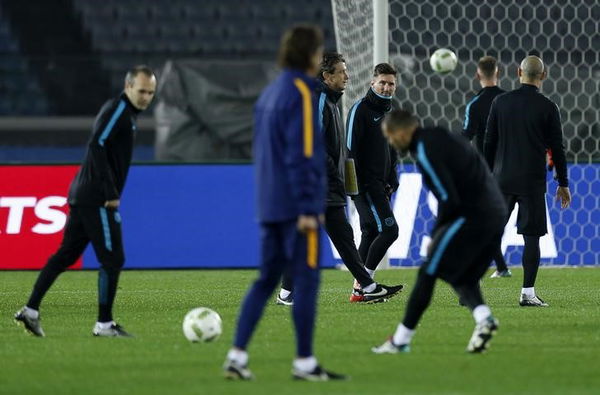
Reuters
Barcelona’s soccer players Lionel Messi (C), his teammates and club coaches attend a training session ahead of their Club World Cup semi-final soccer match against China’s Guangzhou Evergrande in Yokohama, south of Tokyo, Japan, December 16, 2015. REUTERS/Yuya Shino

Reuters
Barcelona’s soccer players Lionel Messi (C), his teammates and club coaches attend a training session ahead of their Club World Cup semi-final soccer match against China’s Guangzhou Evergrande in Yokohama, south of Tokyo, Japan, December 16, 2015. REUTERS/Yuya Shino
By Brian Homewood
Watch What’s Trending Now!
YOKOHAMA (Reuters) – South America’s top players will be playing against the team from their continent rather than for them when Barcelona meet River Plate in the Club World Cup final on Sunday.
In theory, the match is a meeting between the best teams in Europe and South America. In practice, it is more of a contest between South America’s artists, performing for Barcelona, and its workmen, plying their trade with River.
ADVERTISEMENT
Article continues below this ad
Barcelona have been scintillating this season thanks largely to their forward trio of Argentine Lionel Messi, Brazilian Neymar and Uruguayan Luis Suarez, scorer of a hat-trick in Wednesday’s 3-0 semi-final win over Guangzhou Evergrande.
River Plate, on the other hand, have achieved dominance in South America with a team of journeymen, moulded into a winning outfit by inspirational coach Marcelo Gallardo who himself could end up in Europe if his success continues.
ADVERTISEMENT
Article continues below this ad
Modern football finances mean that nearly all of South America’s top players prefer to play in Europe, and in some cases Asia, rather than their own region.
The only exceptions are young players who have yet to make the move, such as River Plate’s Eder Alvarez and Matias Kranevitter, and some veterans who have come home to play out their careers, such as Lucho Gonzalez and Javier Saviola.
Barcelona hope that Messi and Neymar, who missed Wednesday’s match through illness and injury respectively, will both be fit for Sunday when the Catalans could field six South Americans with Claudio Bravo, Dani Alves and Javier Mascherano also set to play.
Even without Messi and Neymar, there is a gaping gap between the two squads.
ADVERTISEMENT
Article continues below this ad
While Barcelona spent an estimated 81 million euros ($87.94 million) on Suarez alone, River Plate’s first-choice starting 11 cost around 5 million euros in transfer fees between them.
In contrast to Barcelona, River’s players have only a smattering of international appearances between them, usually in low-key friendlies. Carlos Sanchez is their most capped player with a modest 11 outings for Uruguay.
Although most of River’s team have played abroad, it has been far from the glamour of the big clubs.
The most successful was midfielder Leonardo Ponzio, who established himself for three seasons at Real Zaragoza.
Defender Jonathan Maidana had two seasons with Ukraine’s Metalist Kharkiv and playmaker Leonardo Pisculichi spent five seasons in Qatar, while forward Rodrigo Mora was signed by Benfica but made only one appearance for the Portuguese club.
Before the exodus to Europe began in the 1980s, South American teams dominated the old Intercontinental Cup, a one-off match between the champions of the two continents played in Tokyo.
Since the current tournament started in 2005, there have been only three South American wins in 10 attempts and all have been achieved by playing as underdogs, shutting up shop and catching their rivals on the counterattack.
For River players, Sunday’s match will be a rare chance to face a team of Barcelona’s calibre.
“All of this is new to me,” said forward Lucas Alario. “It’s a dream for someone like me, who’s always had to fight their way up from the bottom,”
($1 = 0.9211 euros)
(Editing by Ian Ransom)
ADVERTISEMENT
ADVERTISEMENT
ADVERTISEMENT
ADVERTISEMENT


